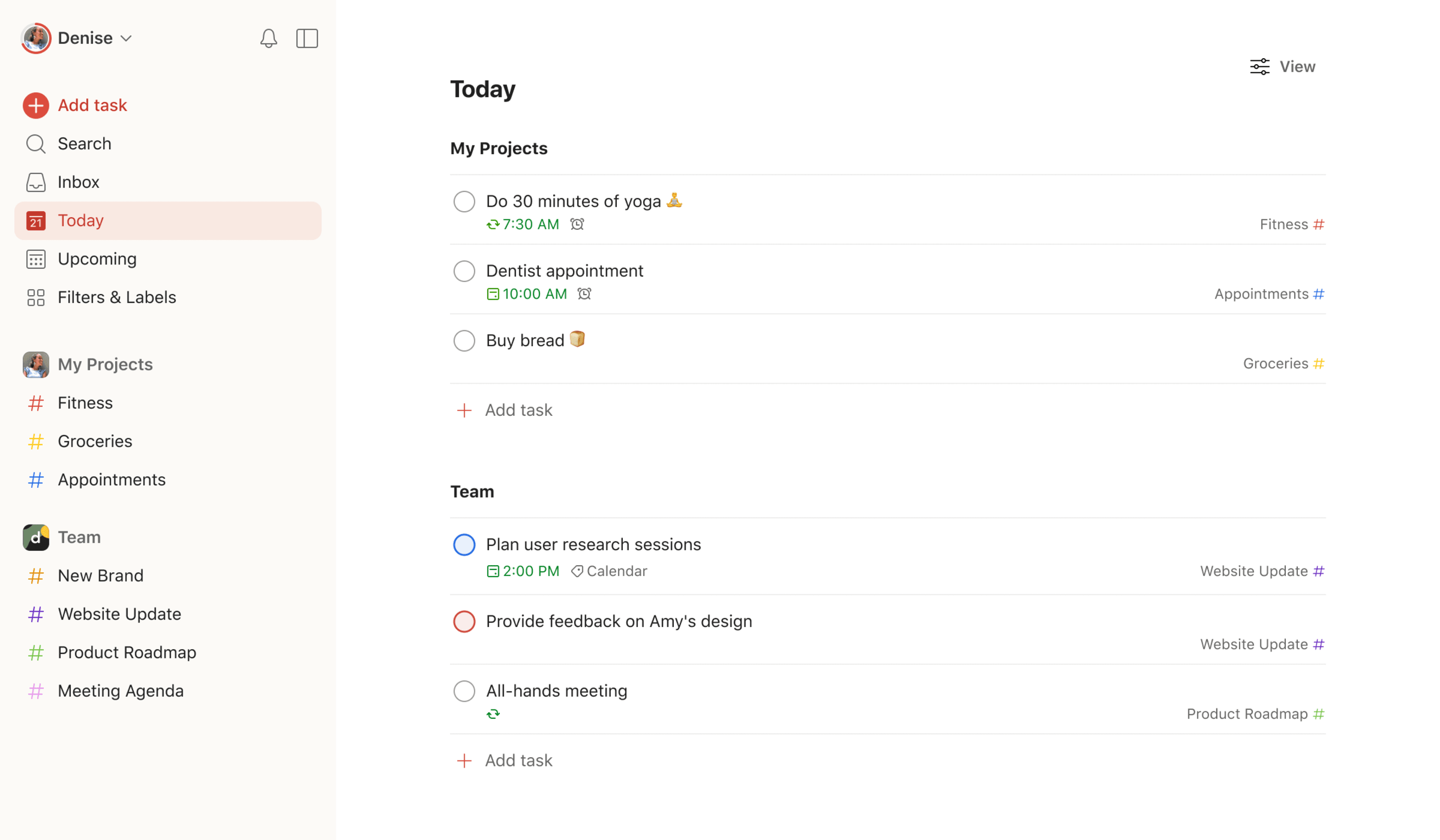Back to all comparisons
Todoist vs Asana
Comprehensive comparison to help you choose the right tool for your needs
Todoist
4.4
Todoist is a task management tool. It enables users to manage tasks, set priorities, and track deadlines across various devices. Its features include task categorization, reminders, and project collaboration, making it suitable for both personal and team productivity.
Premium at $4 per month, paid annually
Visit Website 
Asana
4.4
Asana is a project management tool focused on team collaboration and work organization, offering multiple views for task management, app integrations, and AI features for efficiency. It's suitable for various team sizes, streamlining workflows and aligning goals.
Asana offers three plans: the free Personal plan for basic needs, the Starter plan at $11.59 for expanded features like timeline view, and the Advanced plan at $25.69 for comprehensive project management tools including time tracking and advanced customization.
Visit Website Quick Summary
Todoist Strengths
- Task Management: Create, track, and complete tasks with Todoist. Set deadlines, priorities, and reminders for each task.
- Project Organization: Group your tasks into different projects like work, personal, or travel plans. Break them down into smaller subtasks and sections for better organization.
- Labels and Filters: Use labels to categorize your tasks. Filters help you find tasks quickly, like those due today or high-priority ones.
- Recurring Tasks: Set up tasks that repeat regularly, like daily, weekly, or monthly.
Asana Strengths
- Task Management: Asana excels in task management, allowing users to create, assign, and track tasks efficiently. This feature ensures that team members are always aware of their responsibilities and deadlines, promoting productivity and accountability.
- Project Visualization: With options like Kanban boards and Gantt charts, Asana offers versatile visualization tools. These features aid in understanding the project flow and milestones, making it easier to manage timelines and resources.
- Team Collaboration: Asana fosters seamless team collaboration. It allows for easy communication within tasks, sharing of files, and updating progress, thus keeping everyone on the same page and enhancing teamwork.
- Integration Capabilities: The platform integrates with a wide range of other applications and tools, streamlining workflows and automating processes. This integration makes it a flexible tool that can adapt to various business ecosystems.
Todoist Screenshot

Asana Screenshot

Feature Comparison
| Feature | Todoist | Asana |
|---|---|---|
| Platforms | Android, iOS, iPad, macOS, Windows, Android Wear, and Apple Watch | macOS, iOS, Android, Web, and Windows |
| Integrations | IFTTT, Alexa, Google Calendar, Slack, Gmail, Zapier, Fantastical, Outlook, Chrome, Trello Power-Up | Google Drive, Slack, Zoho Cliq, Zapier, Jira, Zoom, Toggl Track, Loom, Harvest, Gmail |
| Calendar | No Calendar View | Yes |
| Task Management | Labels, Filters, Priority levels, Recurring tasks | Task creation and assignment, due date setting, progress tracking, project organization, tagging, comments, file attachments, task conversations |
| Natural Language Processing | Yes | Yes |
| Analytics | Yes | Yes |
| Time Blocking | Not Available | No |
| Time Zones | Yes | Yes |
| Scheduler | Yes | No |
| Notifications | Yes | Yes |
| Pricing | Premium at $4 per month, paid annually | Asana offers three plans: the free Personal plan for basic needs, the Starter plan at $11.59 for expanded features like timeline view, and the Advanced plan at $25.69 for comprehensive project management tools including time tracking and advanced customization. |
| Customer Support | Average | Average |
Video Overview
Todoist Video
Asana Video
Todoist Overview
Todoist stands out in the productivity tool landscape with its straightforward yet powerful approach to task management. Renowned for its clean design and user-friendly interface, Todoist simplifies the process of managing daily tasks and long-term projects. It allows users to create, organize, and prioritize tasks with ease, making it an ideal choice for individuals and teams alike. With features like recurring tasks, reminders, and progress tracking, Todoist effectively helps users stay on top of their responsibilities.
Pricing Details
(i) Free Version: Suitable for basic task management needs. (ii) Pro Plan: Typically priced around $3 to $5 per month when billed annually. (iii) Business Plan: Generally costs about $5 to $10 per user per month when billed annually. Todoist offers a flexible pricing model catering to a range of users, from individuals to business teams. The free version is a major draw for users with basic requirements.
Asana Overview
Asana stands out as a versatile project management tool, ideal for various team sizes. Its user-friendly interface, coupled with diverse features like task management, project visualization (including Kanban and Gantt charts), and robust team collaboration tools, makes it a top choice. Additionally, Asana's integration capabilities with other apps enhance workflow efficiency. Offering a range of pricing plans, including a free version for smaller teams, Asana caters to a broad spectrum of organizational needs. It's particularly recommended for its ease of use, extensive integrations, and comprehensive project management features.
Pricing Details
Asana offers three main pricing tiers: (i) Personal: This is a free plan, suitable for small teams or individuals. It includes basic project and task management features and supports collaboration with up to 10 team members. Users have access to unlimited tasks, projects, messages, and file storage. (ii) Starter: Priced at $11.59 per user per month, this plan builds on the Personal plan. It allows collaboration with up to 500 teammates and introduces additional features like timeline and Gantt chart views, along with the ability to use forms and automation. (iii) Advanced: At $25.69 per user per month, the Advanced plan includes all features from the lower tiers and adds functionalities such as goals, time tracking, proofing, approvals, and more advanced customization options. Each tier offers a range of features to accommodate different needs, from individual use to more complex team collaboration and project management requirements.
Todoist Key Features
Task Management: Create, track, and complete tasks with Todoist. Set deadlines, priorities, and reminders for each task.
Project Organization: Group your tasks into different projects like work, personal, or travel plans. Break them down into smaller subtasks and sections for better organization.
Labels and Filters: Use labels to categorize your tasks. Filters help you find tasks quickly, like those due today or high-priority ones.
Recurring Tasks: Set up tasks that repeat regularly, like daily, weekly, or monthly.
Team Collaboration: Share projects with others, assign tasks, and work together within the app.
Works Everywhere and Easy to Use: Use Todoist on web browsers, desktops (Windows, macOS), and mobile apps (iOS, Android). The interface is simple, making it easy to start using right away.
Asana Key Features
Task Management: Asana excels in task management, allowing users to create, assign, and track tasks efficiently. This feature ensures that team members are always aware of their responsibilities and deadlines, promoting productivity and accountability.
Project Visualization: With options like Kanban boards and Gantt charts, Asana offers versatile visualization tools. These features aid in understanding the project flow and milestones, making it easier to manage timelines and resources.
Team Collaboration: Asana fosters seamless team collaboration. It allows for easy communication within tasks, sharing of files, and updating progress, thus keeping everyone on the same page and enhancing teamwork.
Integration Capabilities: The platform integrates with a wide range of other applications and tools, streamlining workflows and automating processes. This integration makes it a flexible tool that can adapt to various business ecosystems.
Customization and Reporting: Asana offers extensive customization options, including custom fields and reporting features. These allow teams to tailor their project management experience and generate insightful reports for better decision-making.
User-Friendly Interface: The intuitive interface of Asana is designed for ease of use, making it accessible for teams regardless of their technical expertise. This simplicity ensures a smooth onboarding process and enhances overall user experience.
Conclusion: Which Tool Should You Choose?
Both Todoist and Asana offer unique features and benefits for productivity and workflow management. The best choice depends on your specific needs, team size, and workflow preferences.
Choose Todoist if:
- Task Management: Create, track, and complete tasks with Todoist. Set deadlines, priorities, and reminders for each task.
- Project Organization: Group your tasks into different projects like work, personal, or travel plans. Break them down into smaller subtasks and sections for better organization.
- Labels and Filters: Use labels to categorize your tasks. Filters help you find tasks quickly, like those due today or high-priority ones.
Choose Asana if:
- Task Management: Asana excels in task management, allowing users to create, assign, and track tasks efficiently. This feature ensures that team members are always aware of their responsibilities and deadlines, promoting productivity and accountability.
- Project Visualization: With options like Kanban boards and Gantt charts, Asana offers versatile visualization tools. These features aid in understanding the project flow and milestones, making it easier to manage timelines and resources.
- Team Collaboration: Asana fosters seamless team collaboration. It allows for easy communication within tasks, sharing of files, and updating progress, thus keeping everyone on the same page and enhancing teamwork.